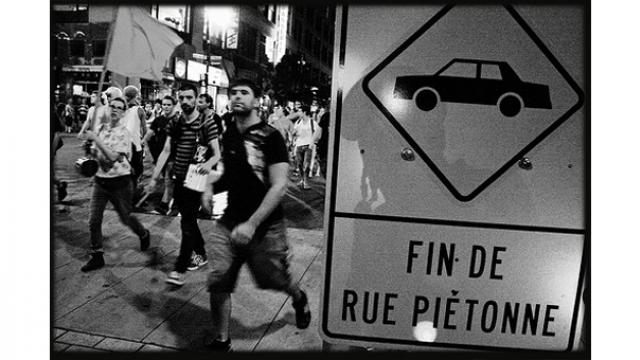
Photo: ScottMontreal/Flickr.
Thousands of protesters took to the streets of Montreal on Wednesday, the same day of the call to a provincial election by the Liberal Party government of Quebec Premier Jean Charest.
Radio Canada and La Presse report that many thousands took part. They gathered at Place Émilie-Gamelin in the center of the city and marched from 9 p.m. to close to midnight. Around 10:30 p.m., Montreal police declared the march "illegal," but that didn't deter anyone in the march. Radio Canada says 17 people were arrested, many for throwing firecrackers.
The co-leaders of the left-wing Quebec solidaire, Amir Khadir and Françoise David, took part in the march. Earlier that day, they announced their party's platform in the election. They and the other QS candidates gathered around them wore the red-square symbol of the student movement.
A key feature of the march was a large group of some 500 people from the neighbourhoods of Villeray-Saint Michel-Parc Extension who had gathered at a 'casseroles' (pots and pans), noise-making rally and then marched along one of Montreal's main arteries to join the larger rally at Place Émilie-Gamelin. Their event was reported extensively on television news. They carried a lead banner reading, "Villeray in defiance," referring to the draconian Law 78 which says such gatherings are illegal. "Defiance" of the Charest government and Law 78 was the theme strongly expressed by the many protesters interviewed and reported in news and television reports of the evening's protest actions.
Law 78 hangs over the the student movement and the entirety of the province like a Sword of Damacles, ready to fall if Charest's Liberals should win the election. Although police have used it to declare pro-student protests to be "illegal," they have refrained, so far, from wielding it to charge anyone or impede and break up the functioning of student organizations and anyone supporting them. The thousands of arrests by police since the outset of the student strike in February have been made using municipal regulations or highway traffic laws.
Trade union leaders have cited the draconian provisions in Law 78 as a reason to not mobilize members more significantly behind the student cause. The opposition Parti québécois says it will immediately abolish the law if elected. The party has a past record in office of harsh, anti-union legislation.
Student and human rights organizations, trade unions and individuals are challenging the constitutionality of Law 78 in Quebec Superior Court, but it will take many months, probably more than a year, to obtain a ruling.
Meanwhile, Jean-Pierre Lord, a sociology student at the Université du Québec à Montréal, has applied to the Quebec Superior Court for permission to proceed with a class action lawsuit against the City of Montreal and its police force for the violent conduct of police at student demonstrations. The lawsuit pertains to the arrest and abusive treatment by police of Lord and other protesters on May 23.
Two of the three large student federations in Quebec -- the FEEQ and the FEUQ -- are actively campaigning in the election to unseat the Liberal Party. The largest and most militant of the federations, CLASSE, is not directly campaigning in the electoral process. It says it will maintain an educational and mobilization footing throughout and following the election for its immediate aim of a freeze on university tuition hikes, the issue that is at the origin of the now-six month long, historic student strike.
Quebec's student federations and their supporters will stage another of their massive monthly rallies in Montreal and other Quebec cities on August 22.
The rally will follow the August 13 re-opening of the school year that was suspended by Law 78 at strike-bound, post-secondary institutions in May.
3 WAYS TO SHOW YOUR SUPPORT
- Log in to post comments













